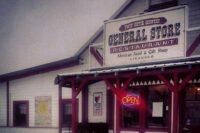David Bowie’s archive opens to the public. Fans can see and touch 1000s of his items
By Canadian Press on September 10, 2025.

LONDON (AP) — When David Bowie died in 2016, he left a vast musical legacy – and a trove of unrealized projects.
Tantalizing details of those abandoned and unfinished ideas are revealed in Bowie’s archive, which opens to the public this week.
The 90,000 items acquired from Bowie’s estate by London’s Victoria and Albert Museum include handwritten notes for a movie in which Major Tom, the fictional astronaut “floating in a tin can far above the world” in Bowie’s song “Space Oddity,” is sent to “a disgruntled America.”
Curator Madeleine Haddon said the never-made film — titled “Young Americans,” like Bowie’s 1975 album of the same name — is “reflective on what it’s like to be a Brit in the U.S., and thinking about international politics and their place in the world.”
Other might-have-beens include “The Spectator,” a stage musical about an 18th-century London outlaw that Bowie was working on shortly before his death from cancer in January 2016 at the age of 69.
It’s about “the relationship between art and politics in London at the cusp of modernity,” Haddon said Wednesday at a preview of V&A’s David Bowie Centre. “I would love to see where he was going with that.”
The center, which opens Saturday, is a treasure chest for Bowie fans and researchers, holding everything from stage outfits and musical instruments – a stringed Japanese koto, Ziggy Stardust’s acoustic guitar – to letters, lyrics, photos, to-do lists and idea-filled sticky notes.
The archive chronicles decades of restless creativity by the shape-shifting musician, who was born plain old David Jones in the London suburbs in 1947.
Bowie donned and shed personas as he moved through musical styles, from glam rock to soul, electronica and collaborations with British jungle and drum ‘n’ bass musicians, including A Guy Called Gerald and Goldie. He also acted in movies and on Broadway, collaborated on stage shows, painted and embraced technology, setting up a 1990s internet service provider called BowieNet.
“He was such a world-builder,” Haddon said. “Music was (just) one angle into the worlds he wanted to build.”
The archive occupies part of the V&A East Storehouse, a hybrid warehouse-museum that opened in June in east London’s Olympic Park. As with the storehouse as a whole, visitors can book appointments to see any of the items for free – and in many cases handle them, under supervision.
“We want visitors to be inspired by Bowie, to pursue their own creativity, discover new stories and make unexpected connections between Bowie, contemporary discussions and themselves,” Haddon said.
Since the bookings site opened this month, the most requested item is a distressed frock coat that Bowie created with British fashion designer Alexander McQueen for his 50th birthday concert at Madison Square Garden in 1997.
Bowie’s impact on fashion is attested to by the 400 costumes in the archive, including Japanese designer Kansai Yamamoto’s knitted jumpsuit for Bowie’s androgynous alien rock star persona, Ziggy Stardust, and the white suit Bowie wore on his 1983 Serious Moonlight tour.
“The Alexander McQueen costumes and some of the Ziggy costumes are proving particularly popular,” said V&A archivist Sabrina Offord.
About 200 items are displayed in cabinets in the archive’s main room, a selection made in consultation with local 18- to 25-year-olds as part of a project to provide opportunities for local young people
“Many didn’t know who he was or they had a lot of questions about why the V&A wanted to build an entire center dedicated to him,” Haddon said. “By the end, they were convinced.”
Some of the items are iconic, others delightfully mundane. There’s the key to the Berlin apartment Bowie shared with Iggy Pop in the 1970s, and his Rarotonga driver’s license from a period filming the 1983 movie “Merry Christmas, Mr. Lawrence” on the South Pacific island.
Bowie also kept many items sent to him by fans, including drawings, paintings and a handmade music box.
Almost a decade after his death, Bowie is a musical icon whose influence on popular culture endures. But it wasn’t always that way.
The archive includes a letter written by Bowie’s father, Haywood Stenton Jones, trying to get teenage David, then a struggling musician, a job with a London company. His son was a hard worker and “a real trooper,” Jones stressed.
Next to it is displayed a brief rejection letter Bowie received from The Beatles’ record label in 1968.
“Apple Records is not interested in signing David Bowie,” it reads. “The reason is we don’t feel he’s what we’re looking for at the moment.”
Jill Lawless, The Associated Press
-26




